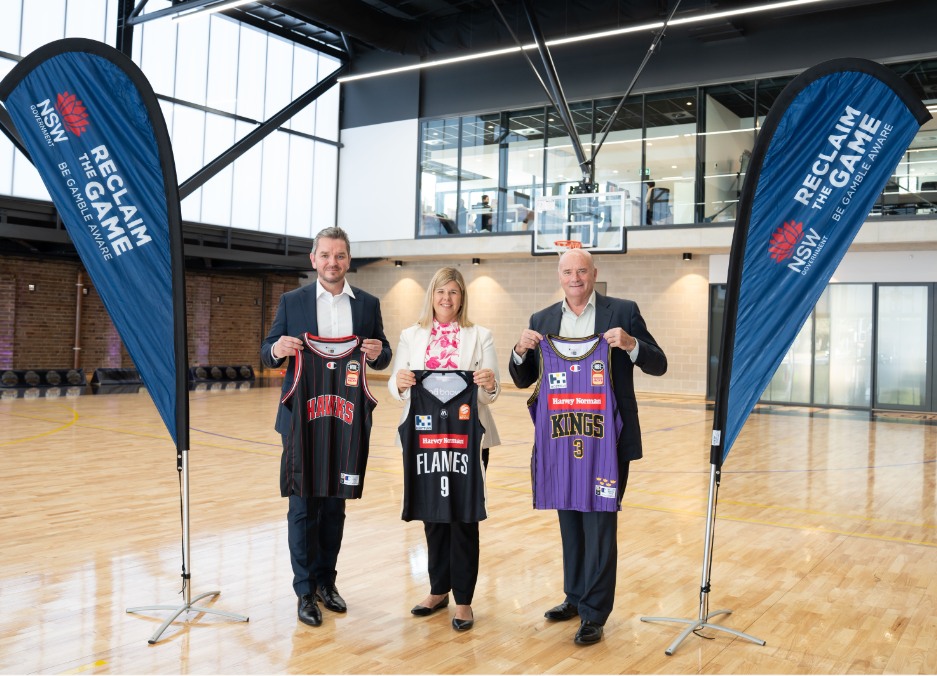
The Illawarra Hawks, Sydney Flames and Sydney Kings are among the latest NSW sporting teams to have pledged not to accept gambling-related sponsorship as part of the NSW Government’s Reclaim the Game campaign. Photo: GambleAware NSW.
Australia’s biggest sporting codes have seen a monumental shift in the way players are protected since the turn of the decade.
Gone are the days of high bumps, sling tackles, spears and carelessly launching yourself for the ball, and I believe it’s for the better.
The AFL and NRL alone have weekly debates about the effects of concussions, protecting the player who is getting tackled and the mental health of players. Sure, it took pricey lawsuits and the poor health of players affected to get there, but there has clearly been a shift.
We’re only a handful of weeks into the season and we’ve seen players in both codes who have been suspended for two-plus weeks who wouldn’t have even been cited just five years ago. Look at Peter Wright in the AFL and Jack Wighton in the NRL.
Even in cricket, players who are hit in the head can be subbed off and new players brought in under the concussion substitute ruling.
While all of this is trending in the right direction, I truly believe that if sports are serious about the mental health of their players and followers, something needs to be done about the sheer number of gambling sites that surround our favourite sports.
Sportsbet, Ladbrokes, PointsBet, Neds – we’ve all seen them.
“Hi, Browny here with my pick for tonight’s best same-game multi!”
“Here are the latest odds, thanks to PointsBet.”
“If your team is up at half-time, we’ll pay you out a winner!”
Quotes like these have become commonplace and it’s getting a bit ridiculous. The issue isn’t that they exist, it’s the sheer number being advertised across multiple forms of media – text messages, social media, emails, YouTube – before, after and during play; these ads are impossible to avoid. It’s become such a trend that many people believe it’s just a part of watching sports.
For those thinking it’s not a problem, research conducted by GambleAware in 2022/23, the NSW Government’s gambling support network, shows that young men who bet on sports are more likely to form an addiction than those who buy lottery tickets.
Sports betting is also one of the only forms of gambling that is rising. Pokies, lottery and TAB forms of gambling are all decreasing in NSW but the number of gamblers using apps has increased dramatically, no doubt due in part to the number of apps and promotions advertised.
The same research shows that men aged 18 to 24 are more likely to bet on sporting events while those aged 45 to 54 are more inclined to bet on horse or greyhound racing.
Research by the Australian Institute of Health and Welfare shows 38.1 per cent of people bet on horse racing each year while 33.8 per cent bet on sports. When looking at the same research, there is a clear spike in men compared to women with 48.4 per cent of men gambling on racing while only 28.8 per cent of women do. The same goes with sports – 47.5 per cent of men bet while only 21.3 per cent of women do.
The reason this statistic is so alarming is that around 23 per cent of regular sports bettors – 134,000 adults – had moderate to severe gambling problems with the average sports bettor spending more than $1000 a year according to research conducted by the Australian Institute of Family Studies in 2017.
The same researchers indicated that this number skyrocketed following COVID-19 lockdowns with the amount of money made by gambling services rising from $24.8 billion to more than $50 billion in 2022 with the average spending of a sports bettor rising to more than $2500 a year.
Gambling services are aware of this too.
The Australian Communications and Media Authority estimates that from May 2022 to April 2023 gambling services spent $238.63 million on advertising on free-to-air TV (in metro and regional TV markets), metro radio and online.
In 2023, the Australian Institute of Family Studies indicated that 75 per cent of Australians participate in gambling (not just sports betting) and 46 per cent of gamblers were classified as being at some risk of gambling harm. If 75 per cent of Australians gamble each year, and 46 per cent of gamblers are at risk, that’s nearly nine million people who are at risk of gambling addiction in some way, shape or form – that is alarming!
While the NSW Government’s ‘Reclaim the Game’ campaign has seen 18 of the state’s biggest sporting clubs, including Canterbury-Bankstown Bulldogs, South Sydney Rabbitohs, Illawarra Hawks, Sydney Kings, Sydney Flames, Macarthur FC, Western Sydney Wanderers, Sydney Sixers, Sydney Thunder, NSW Breakers, Sydney Swans, NSW Swifts and GIANTS Netball all pledge to turn down betting-related sponsors, I believe codes such as the AFL, NRL, Cricket Australia, A/W League and NBL have a duty of care to protect the wallets and mental health of fans across the country.







